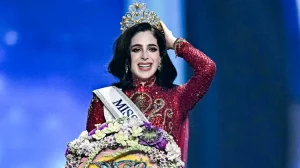There is something deeply compelling about the way certain women rise. Not loudly or theatrically, but with the kind of steady resolve that feels almost ceremonial. Onyinyechi Basil belongs to that lineage. As she steps onto the Miss Universe 2025 stage, she carries far more than a sash; she carries a country’s ongoing conversation about women’s health and the quiet bravery required to change the system from the inside.
The pageant returns to Thailand this year, filling the vast halls of Bangkok’s Impact Challenger with 120 contestants whose stories travel far beyond the runway. For Nigeria, that story begins in a small apartment where Onyinyechi grew up with her father, and where ambition took root long before the spotlight ever found her. It continues in lecture halls where she studied biochemistry, and in hospital corridors where she witnessed the gaps in maternal care that shape so many women’s futures.
Read Also: The African Queens Bringing Heart, Heritage, and Quiet Power to Miss Universe 2025
Her commitment to maternal health began after the loss of her brother, a grief that sharpened into purpose. First came Nwanyi Bu Ife, a grassroots effort to make maternal care accessible to underserved women. Then the Reach Moms Initiative, a program that brings childbirth education, essential supplies, and hospital access to rural communities where the journey to motherhood is often shadowed by risk.


Credit: Onyinyechi/Instagram
As she prepares to walk alongside contestants from more than a hundred nations, Onyinyechi’s presence speaks to a modern kind of pageantry. One where beauty and advocacy sit side by side, where the evening gown shares the same space as the cause that shaped the woman wearing it. When the outgoing Miss Universe, Victoria Kjær Theilvig of Denmark, passes the crown to her successor, the moment will be ceremonial. What Onyinyechi brings, however, is lived, urgent, and rooted in home.
Her story reminds us that representation is not just about being seen on a global stage. It’s about carrying the voices of women who rarely get the chance to be heard.








